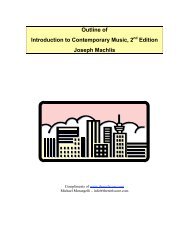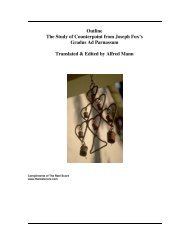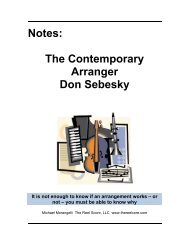An Outline of The History of Western Music Grout ... - The Reel Score
An Outline of The History of Western Music Grout ... - The Reel Score
An Outline of The History of Western Music Grout ... - The Reel Score
You also want an ePaper? Increase the reach of your titles
YUMPU automatically turns print PDFs into web optimized ePapers that Google loves.
2: the first composer recognized by both Europeans & Russians as an authentic<br />
native voice was Mikhail Glinka (1804-1857)<br />
3: carried on with Alexander Dargomïzhasky (1813-1869) & Tchaikovsky (1840<br />
-1893) who chose Russian subject matter<br />
b) Mighty Five (Moguchaya Kuchka)<br />
1: In the second half <strong>of</strong> the 19th century 5 leading Russian composers banded<br />
together in a group know as the Mighty Handful (Mighty Five)<br />
2: Alexander Borodin (1833-1910), Modest Musorgosky (1839-1881), Mily<br />
Balakirev (1837-1910), César Cui (1835-1918), & Nikolay Rinsky-Korsakov<br />
(1844-1908)<br />
i- Admired <strong>Western</strong> music but felt alienated from the St. Petersburg<br />
Conservatory - founded in 1862 by <strong>An</strong>ton Rubinstein (1829-1894)<br />
ii- seeking a fresh approach, they utilized folksong, modal & exotic scales, and<br />
folk polyphony<br />
c) Modest Musorgorsky (1839-1881)<br />
1: Greatest <strong>of</strong> the Mighty Handful - although quoting actual Russian folk tunes only<br />
occasionally they were rooted in his musical nature<br />
i- his melodies follow characteristic folk elements<br />
ii- his harmonic style was also modal - it was the Russians who introduced<br />
modality into the general musical language (an important influence on<br />
<strong>Western</strong> <strong>Music</strong><br />
2: Musaorgsky's harmony was highly original - revolutionary and along with his<br />
rhythms may have been culled from his memories <strong>of</strong> polyphonic folk singing<br />
d) Other Russian composers<br />
1: Nikolay Rimsky-Korsakov (1844-1908)<br />
i- forms a link between the first generation <strong>of</strong> Russian composers - Glinka &<br />
the Mighty Handful - and those <strong>of</strong> the early 20th Century<br />
ii- pupils were Alexander Glazunov (1865-1936) & Igor Stravinsky (1882<br />
-1970)<br />
2: Sergei Rakhmaninov (1873-1943) - left Russia in 1917 and never returned<br />
3: Alexander Skryabin (1872-1915) - influenced by the chromaticism <strong>of</strong> Liszt &<br />
Wagner<br />
6. Central Europe<br />
a) Bedrich Smetana (1824-1884) & <strong>An</strong>tonin Dvorak (1841-1904)<br />
1: Bohemia was an Austrian Crown land for centuries and so had been (unlike<br />
Russia) in the mainstream <strong>of</strong> European music<br />
2: the musical language <strong>of</strong> these two composers was basically European -<br />
Smetana derived from Liszt, and Dvorak leaning towards Brahms<br />
b) Leos Janacek (1854-1928)<br />
1: he anticipated Bartok in deliberately collecting and editing folk music<br />
2: his own mature style grew out <strong>of</strong> the rhythms and inflections <strong>of</strong> Moravian<br />
peasant speech & song<br />
7. Other Countries<br />
a) Norway - Evard Hagerup Grieg (1843-1907) - superimposed national<br />
characteristics on an orthodox style learned in his youthful studies at the Leipzig<br />
Conservatory





